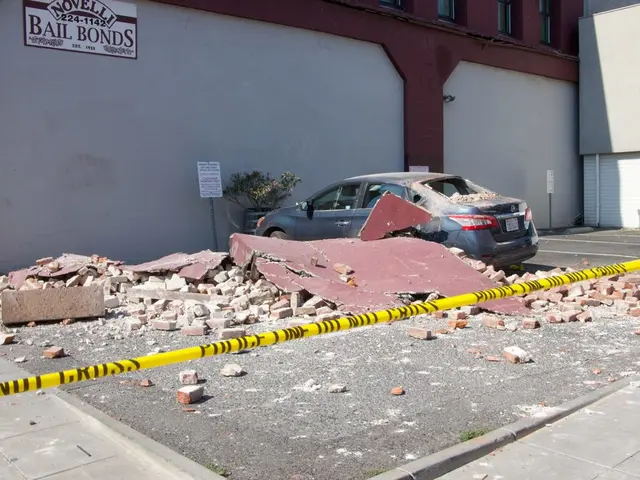Enhanced anxieties surface over Latvia's customs service capabilities
In the face of increasing volumes of smuggled goods, particularly cigarettes, and the geopolitical situation, doubts have arisen about the ability to detect illegally imported cargo at Latgale's customs checkpoints in Latvia. To address this issue, a multi-faceted approach is needed to strengthen infrastructure, enhance personnel training, and improve human resource capacity.
Infrastructure Improvements
Investing in modernising customs checkpoint facilities is crucial. This includes the implementation of advanced detection technologies such as scanners, surveillance systems, and possibly drone monitoring. Enhanced physical infrastructure supports more effective inspection and seizure operations.
Targeted Training Programs
Customs officers require specialized training to recognise smuggling tactics. This includes identifying false import declarations disguising tobacco as other goods, and detecting cutting-edge smuggling methods like drone deliveries. Training should also cover legal frameworks and enforcement protocols aligned with EU directives.
Human Resource Expansion and Retention
Addressing shortages by recruiting additional customs personnel focused on tobacco control and enforcing excise tax compliance is essential. Consider deploying financial guarantees and administrative controls to manage risks related to raw tobacco movements, as used by other EU states. Ensuring sufficient, well-qualified staff is critical given the complexity of illicit trade.
Coordination with EU Initiatives
Latvia can benefit from stronger cooperation with EU bodies pushing for harmonized minimum excise rates and anti-smuggling measures. Coordinated action can reduce incentives for smuggling driven by price disparities.
Use of Data and Intelligence Sharing
Implementing systems for monitoring tobacco product flows and intelligence sharing with neighbouring countries can help detect and disrupt smuggling networks, especially in border regions prone to illegal tobacco trafficking.
Most smuggled goods have been detected in the cities of Daugavpils, Rezekne, and Salaspils. The smugglers, considered professional offenders or border crossers, are adaptable and take measures to avoid detection by the dogs and human customs officers. Most of the smuggled cigarettes in Latvia are transported by rail from Belarus, and a significant number of trained dogs at the border specialize in detecting tobacco products.
The Cynology Department of the Customs Administration of the VID is responsible for training the dogs used at the border. Valdis Bikovskis, a Senior Expert at the Cynology Department, and Sandra Kārkliņa-Ādmine, the Deputy Director of the Customs Directorate of the State Revenue Service (VID) in Latvia, are key figures in this fight.
However, there is a lack of proper infrastructure at Latgale's customs checkpoints, and an acute shortage of human resources. One of the main problems is that customs officers have to do a lot of physical work, such as climbing into carriages and searching. The authorities in Latvia are aware of these problems and have promised to address them.
In 2023, a total of 23 million cigarettes were detected in Latvia, with the number increasing by 10 million compared to the previous year. The Indra customs checkpoint is where most of the smuggled cigarettes are actively detected. Despite these challenges, the fight against cigarette smuggling continues, and progress is being made towards a more secure and efficient Latvia's customs system.
References:
[1] European Commission (2021). "Fighting tobacco smuggling: Commission proposes to strengthen tobacco taxation and control". European Commission.
[2] European Union Intellectual Property Office (2021). "Tackling tobacco smuggling: EUIPO and customs authorities cooperate to protect consumers and revenue". European Union Intellectual Property Office.
[3] Latvijas Vestnesis (2021). "Latvijas valsts cielavas izdzīvojums par dārznieku smugli: 23 miljones cigareta". Latvijas Vestnesis.
In light of the growing issue of smuggled goods, particularly cigarettes, in Latgale, there is a pressing need for financial investment to upgrade infrastructure, including the installation of advanced scanners, surveillance systems, and possibly drone monitoring, at Latgale's customs checkpoints (infrastructure, finance, transportation, general-news).
To tackle the sophisticated tactics used by smugglers, it is vital to implement targeted training programs for customs officers, strengthening their ability to identify false import declarations and detect advanced smuggling methods (industry, crime-and-justice).
Given the complexity of the illicit tobacco trade, the recruitment of additional customs personnel specialized in tobacco control and excise tax compliance is essential. This can be complemented by the deployment of financial guarantees and administrative controls for raw tobacco movements, as practiced by other EU states (human resource expansion, finance, crime-and-justice).




